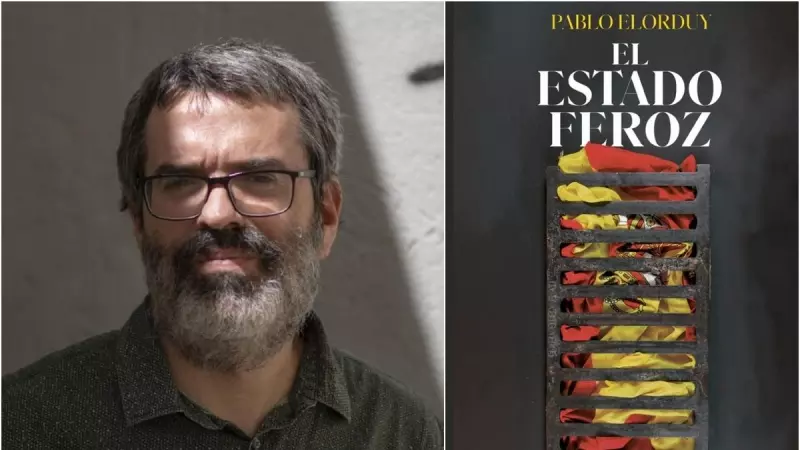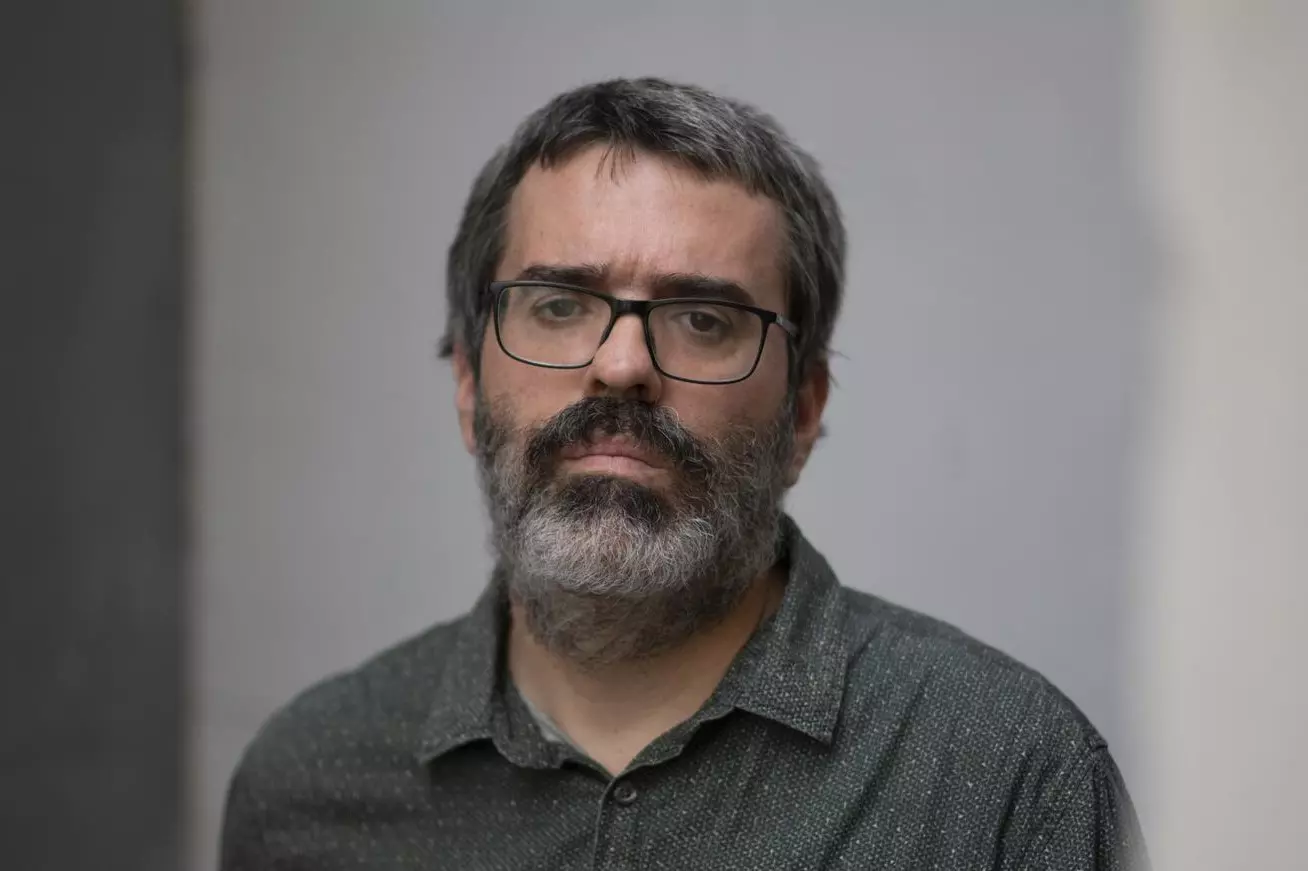The journalist Pablo Elorduy (Madrid, 1978) analyzes in The fierce state. Sewers, lawfare and deep state in the Regime of 78 (Verso) how the “exceptional or savage powers” accelerated their repressive machinery after the economic crisis of 2008 to stop the phenomena of the new politics and the rise of independence. For this, according to the founder of The Jumpthey used some judges, police and the media.
If the 2008 crisis had not occurred, would there be less mud?
Yes, it is a key factor. The mud was born as a response to the unexpected and a social emergency situation. The powers that be were bewildered and nervous after the unexpected popular reaction of the 15M movement. Then, a new stage of the mud began that has been reflected constitutionally with the gag law and with illegal measures such as the patriotic police.
But wasn’t Spain already a quagmire before?
Clear. The entrenched inheritances could not be uprooted because there were many interests of the PP and the PSOE. What happened later is that the process accelerated, also in Justice, with the figure of the judge-soldier and the fury against the opinions, whether of a rapper or a comedian. A symptom that exceptional or wild powers were being activated.
You make it clear that we cannot speak of Spain as the only “fierce State”, but its particularity is that it has been roaring since Franco’s era, while other European countries buried their totalitarian past decades ago.
Spanish fascism survived without a purge for much longer, something that occurred in Portugal after the Carnation Revolution, for example. The step here was “from law to law”, as Torcuato Fernández Miranda said regarding the judicial power. However, the quagmire and the machinery of repression predate Francoism, although during the dictatorship it was culture It is modernized and in 2001 it is reinforced with the war against terror, when more exceptional powers are generated.
In addition to the loss of legitimacy and the situation of instability caused by the jihadist attacks, do the effects of the recently unleashed wars, with migrations in the background, also feed these “savage powers”?
Clear. Since security discourses begin to dominate debates and reach public opinion – always with a cumulative demand for security and the need for protection – paranoia grows among citizens and, at the same time, a business generated around to wars, as is the case of Israel. This is how those exceptional powers willing to do anything are legitimized because, as Machiavelli said, “there is nothing ignominious if it benefits the country.” Faced with the loss of freedoms, we should ask ourselves: is the “benefit of the country” worth putting the boot on our necks?
Would it establish a significant difference in the repressive policy between the PP and the PSOE?
Yes, because the PSOE has proposed, forced by the needs to continue advancing its Government agenda, to repeal some points of the gag law. However, the person who used the citizen security law the most was Minister Fernando Grande-Marlaska during the pandemic, when there were excesses by various police forces, not to mention hot returns.
And if we go back in time, in 1992 the PSOE approved the much-discussed Corcuera law, also known as the kick-the-door law, which is due to Felipe González’s obsession with order and social control. A continuous measure with that idea of the transition that the streets had to be asleep at all costs, no matter who fell, and that represented the prefiguration of this system where security overrides other rights.
A decade earlier, the Government of José María Aznar pardoned former socialist minister José Barrionuevo and former Secretary of State Rafael Vera, convicted of the kidnapping of Segundo Marey by the GAL.
The press of the time interpreted that the PP could purge the Ministry of the Interior. However, when he came to power, he not only did not do so, but he also restored the condemned as figures with a certain level of authority. Aznar embraced the idea that reason of state always prevails and it was implicit that the PP was not so much against the GAL, but rather considered that media operation to harass and demolish the PSOE a springboard to reach the Government.
In the book I rescue a quote attributed to the former socialist Minister of the Interior Antonio Asunción: “The worst thing that is happening is corruption. Killing people by ETA is a shame. What happens is that it is not presentable.”

Who do the sewers of the State fear more: the reds or the independentists?
They are more afraid of those who can take away what interests them and consider theirs. If we talk about money, businessmen fear communists more. If we talk about territorial unity, the military fears the separatists more.
Do you attribute the rise of Vox, the emergence of Alvise Pérez and the radicalization of the PP to the ‘procés’ or to the emergence of Podemos?
Vox was a response to Catalonia, but also to what the extreme right understood as a weakness of a certain Popular Party, embodied by Mariano Rajoy, which underestimated the red threat. Among the most intransigent sectors of Vox there is resentment and hostility towards a PP that they see as a version of social democracy with conservative overtones.
What is still unknown about the deep and ferocious state?
More than specific issues such as 23F or the patriotic policethe relationship of the deep State with the Catholic hierarchy and the expression of what is talked about in the Bernabéu box, in restaurant booths and on pleasure trips is unknown: contracts, ordinances, judicial rulings… Are those conversations Do they have a practical effect or are they simply a background swell where each of the pieces already knows what it has to do?
He advocates the declassification of official secrets, from 23F to the actions of the CNI during the jihadist attacks, including the dirty war against ETA: “What remains in the shadows has the capacity for political influence” and, in addition, causes “the growth disorder of conspiracy theories.
And when is the information about the Pegasus program going to be declassified? When are we going to know the names of the judges who authorized some wiretapping of Catalan politicians? When will we know the data on arms exports to Israel? If we knew, we could have a much cleaner look at the past, we would combat conspiracy theories and we wouldn’t just have a few leaks to the press with interested versions.
Was a character like Commissioner Villarejo imaginable before he became popular? Perhaps, if he were to star in a movie or a series, it would be implausible because it surpasses fiction.
Villarejo has promoted the idea that “there is a man in Spain who does everything”, like Astrud’s song. She gets into all the messes and is a mix of Jessica Fletcher, who is present in all the murders that take place in the United States, and Mortadelo, who changes disguises at every moment. However, you can’t believe everything he says, because you would miss the mark.
He defines him as the “businessman policeman”, with “an excessive passion for real estate assets.” It’s not just him, but also his clients.
Villarejo is a kind of fixer either sherpathat is, a solver. But if you know the weaknesses or what a person can give you, it is also very easy to seduce or extort them. We are talking about people who, like everyone else, have weaknesses, even if they are judges, politicians or Ibex 35 businessmen. That is why the purge has been so difficult…
You offer a diagnosis, but not a solution to the problem. However, he leaves the door open to hope by emphasizing that there could be “tools to propose something different.”
Political power has the key. If the budget item allocated to the military industry is dedicated to education, health, unemployment benefits or social services, you will achieve better results in terms of democratization, training and the configuration of a society that does not have fears, complexes or obsessions with security.
A political power that should dare to distribute wealth, although it will encounter resistance from those companies linked to the political and judicial power, which will try to torpedo its action. We saw it on a small scale in the town halls [del cambio] and we are seeing it now in the coalition government.
We have the roadmap. People need to be called together to be able to carry it out, with a clear idea and in a peaceful manner, without being divided, beaten and beaten, as has happened since 15M.
